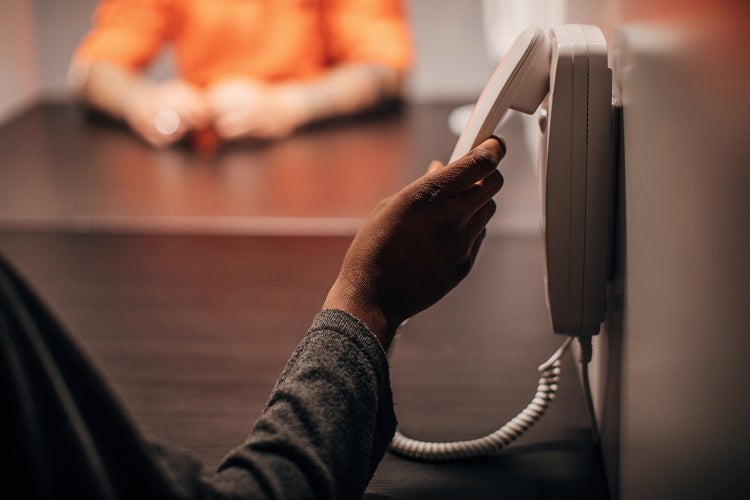-
What to Do If Your Loved One Gets Arrested
What to Do If Your Loved One Gets Arrested
Getting a call that your loved one has been arrested is stressful and overwhelming. It’s natural to feel unsure about what to do next. The good news is that you can take action from the outside to help your friend or family member get out of jail sooner. Here’s what to do.

Gather Information
When your loved one is arrested in North Carolina, the first step is to gather as much information as possible about the situation, including:
- Where they are being held: This could be a local jail or a county facility.
- The charges they’re facing: Are they accused of a minor offense like trespassing, or are the charges more serious?
- Their bail amount: Bail is the money you’ll need to post to have your loved one released from jail until their court date.
Contact a Defense Lawyer
Reaching out to a defense attorney is an important step. A lawyer can guide you through the legal system and help protect your loved one’s rights. Depending on the situation, you may want to consult a lawyer who specializes in wrongful arrest, arrest warrants, or accusations of resisting arrest. It’s important to hire a lawyer familiar with local laws in North Carolina, especially if the arrest was unexpected.
Ask the Right Questions
Here’s what to ask to help you make the right decisions:
- How long will my loved one be in custody? In most cases, the police can hold a suspect for up to 24 hours without formally charging them. This timeframe is extended for serious offenses. If the suspect is charged with a crime, they will either be detained until their first court appearance or released on conditional bail, where they must follow specific conditions until their hearing.
- Can I speak to them while in custody? Yes, you can typically contact your loved one while they are in jail. Offer them support and reassurance, and explain that you’re working on getting a lawyer. Remember, calls from jail are monitored, so avoid discussing details about the case over the phone, as anything they say could be used against them in court.
- Are there any errors in the paperwork? Make sure you understand the charges your loved one is facing by reading the official arrest paperwork. Confirm that all information, such as the date, time, and location of the arrest, is correct. Address any errors right away.
- When are the upcoming court dates? Once bail is posted, keeping track of court dates and legal deadlines is essential. Missing a court appearance could cause a bench warrant to be issued against your loved one, and they may forfeit bail.
Cooperate with the Authorities
While it’s natural to feel upset or frustrated when a loved one is arrested, arguing or becoming combative with the police or jail staff doesn’t help anything. Instead, remain calm and cooperate when asked for information or paperwork. This helps things move smoothly and gives you a better chance of getting your loved one out of jail sooner.
Understand How Bail Works
One crucial step when your loved one gets arrested is posting bail. This allows them to go home while awaiting their court date, giving them time to meet with their lawyer and prepare their defense.
Bail is a sum of money that acts as insurance between the court and the accused. The amount is set by the court based on the severity of the charges and the likelihood of the person fleeing before their trial. If you can afford the full bail amount, pay it directly to the court, and your loved one will be released. This is called a cash bond. However, bail amounts are often set very high, so you may not have that kind of money on hand. That’s where a bail bond comes in.
A bail bond is when a company posts the full amount on your behalf in exchange for a 10% to 15% fee. Keep in mind that this percentage is a fee for the bail bond agent’s services and is non-refundable. If your loved one misses a court date, most bond companies immediately revoke the bond. However, 1st Choice Bonding & Surety works with clients to help them reschedule their court dates and avoid additional penalties.
When Time is of the Essence
Do you need help posting bail after your loved one has been arrested? 1st Choice Bonding & Surety is available 24/7 to assist. With over 20 years of experience and multiple locations across Concord, Salisbury, and Gastonia, NC, we have the expertise to guide you through the bail process. We are committed to fast response times and building relationships with our clients. Act quickly and contact us today! We are the key to your loved one’s release.
-
Demystifying Warrants: What You Need to Know
Demystifying Warrants in NC: What You Need to Know
Facing a warrant can be overwhelming, especially when you’re unsure what steps to take next. Whether it’s for a missed court date, failure to pay fines, or an unexpected charge, demystifying warrants can help you know what to do if you’re served with a warrant in North Carolina.

What Is a Warrant?
A warrant is a legal document issued by a judge that authorizes law enforcement to take a specific action, such as arresting someone, searching a property, or seizing evidence. Warrants are based on probable cause, meaning law enforcement must show the court that there is sufficient reason to believe a crime has been committed.
Types of Warrants
Warrants come in different forms, depending on the action law enforcement is authorized to take.
- Arrest warrants are the most well-known types of warrants. An arrest warrant authorizes police to take someone into custody if they are suspected of committing a crime. These warrants can be issued for serious offenses or minor infractions. If you have an open arrest warrant, it’s recommended that you handle it quickly to avoid a surprise arrest at home, at work, or during a routine traffic stop.
- Bench warrants are issued when a person fails to appear in court after being summoned. If you miss a court date—whether for a traffic ticket, criminal charge, or other legal matters—a bench warrant can be issued for your arrest. Unlike arrest warrants, bench warrants don’t require probable cause of a crime, only proof that you missed your scheduled court appearance.
- Search warrants allow police to search a specific location for evidence related to a crime. A search warrant must clearly describe the location to be searched and the items law enforcement is looking for. If the police show up with a search warrant, you have the right to ensure the search is conducted according to the warrant’s terms.
- Civil warrants are typically used for non-criminal issues, like when someone owes a debt. For example, if you fail to pay court-ordered child support or other financial obligations, a civil warrant could be issued against you.
What Should You Do If You’re Served with a Warrant?
Finding out there’s a warrant for your arrest in North Carolina is alarming news. Here’s what you should do if you’re served with a warrant:
- Read it carefully: Make sure you understand the warrant’s purpose. Is it an arrest warrant, a bench warrant, or something else? The warrant should specify what action law enforcement is authorized to take and the charges against you. Note the jurisdiction that issued the warrant, the issuing judge’s signature, and whether there are any missing or incorrect details that invalidate the warrant.
- Exercise your rights: You have the right to remain silent and the right to an attorney, even if you’re not yet under arrest. If the police come to your home or workplace to serve a warrant, ask to see the warrant and verify its details before answering any questions.
- Check for open warrants: If you’re unsure whether a warrant has been issued against you, check with local law enforcement or search online databases for open warrants in North Carolina so you can address the situation before it escalates.
- Consider turning yourself in: Ignoring an arrest or bench warrant won’t make it go away, and you may be arrested at the worst possible time. Turning yourself in shows the court that you’re willing to cooperate and may lead to a more favorable outcome, such as the option to post bail immediately and avoid jail time while you await your trial.
- Work with a bail bondsman: If you’re arrested and need to post bail, a bail bondsman can help. They will post the full amount of your bail for a 10% to 15% fee, which allows you to be released from jail until your court date.
Take Action and Secure Your Release
The longer you wait to address an open warrant, the worse the situation can become. Dealing with the situation quickly and calmly is the best way to protect your freedom and future.
If you or someone you know has been arrested and is looking to post bail, 1st Choice Bonding & Surety is the right place to turn. We have offered bail bonding services for over 20 years, with 6 locations across Concord, Salisbury, and Gastonia, NC. We understand the stress and urgency of your situation, which is why we’re available 24/7 and respond within 5 minutes or less. Contact us today for the trusted help you need when legal challenges arise.
-
Types of Domestic Violence Charges
Types of Domestic Violence Charges
Many people believe that “domestic violence” is a specific criminal charge, but in North Carolina, it’s actually an umbrella term that encompasses various offenses. These crimes occur between individuals in close relationships—such as spouses, partners, or family members—and can range from physical violence to emotional manipulation. Understanding the different types of domestic violence helps you know your rights and what to expect if you’re arrested on these charges.

Criminal Offenses Classified as Domestic Violence
Here is a breakdown of what is considered domestic violence in North Carolina.
Physical Abuse
Physical abuse covers any bodily harm or threat of harm to the victim. Specific offenses may be charged based on the details of the incident.
- Simple assault: This is a common charge in domestic violence cases. It typically involves minor injuries or the threat of violence without a weapon. Even a small physical altercation, like a shove or slap, can result in a simple assault charge.
- Assault on a female: Only men over 18 can be charged with this crime. Although it seems unfair under the Equal Protection Clause in the Constitution, North Carolina Courts have upheld its legality.
- Assault on a child: This charge applies when the victim is a child under 12, making it particularly serious in domestic violence situations involving family members or caregivers.
- Assault with a deadly weapon: The charge is upgraded when a weapon is involved, even if it doesn’t cause physical harm. Weapons can include anything from knives and guns to household items used with intent to harm.
Emotional and Psychological Abuse
This type of domestic violence involves actions that intimidate, control, or instill fear. While not always visible, emotional abuse can still lead to criminal charges.
- Communicating threats: This charge is filed when someone verbally or in writing threatens physical harm to another person. It’s common in situations where emotional manipulation and intimidation are used to maintain control over a victim.
- Stalking and harassment: These charges apply when the accused repeatedly follows or contacts the victim, causing fear for their safety. Harassment can occur in person or through digital means, like texts or social media.
Sexual Abuse
Sexual abuse in domestic violence cases refers to any non-consensual sexual activity. Charges under this category range from sexual assault to rape, and they carry heavy penalties due to the physical and emotional trauma involved.
- Sexual battery: This charge involves non-consensual sexual contact, which can include unwanted touching of a sexual nature.
- Rape: This is a more severe charge involving non-consensual penetration. In domestic situations, it is often accompanied by other forms of abuse, like physical violence or coercion.
Economic Abuse
Economic abuse occurs when one partner controls the other’s financial resources, limiting their ability to leave the relationship or become self-sufficient. While there are no specific criminal charges called “economic abuse,” related charges may apply.
- Theft: If one partner takes money or property from the other without consent, they can be charged with theft.
- Coercion or fraud: These charges may arise if someone manipulates their partner financially, forcing them to make financial decisions or transactions under duress.
Digital Abuse
In today’s tech-driven world, abusers may use technology to intimidate or control victims. This often involves tracking someone’s movements or harassing them online.
- Cyberstalking: This involves using electronic means to harass or intimidate someone. In domestic violence situations, it often goes hand-in-hand with emotional or psychological abuse.
- Unauthorized access: Gaining access to a partner’s private digital accounts without permission can result in criminal charges, especially if used to manipulate or control.
The Bail Process for Domestic Violence Charges
When someone is arrested for domestic violence in North Carolina, the immediate goal is usually to post bail. The judge sets the bail amount based on the charge’s severity, any previous criminal history, and whether the defendant poses a risk to the victim. The process can be confusing, and securing a bond quickly is essential to minimize the time in jail.
If you’re unable to post bail on your own, a bail bond company can help. Bonding agents charge a non-refundable fee—usually 10% to 15% of the total bail amount. Once the fee is paid, the bondsman guarantees the full bail to the court, allowing the defendant to be released. This makes it easier for individuals to prepare for their legal cases from home rather than behind bars.
Trusted Bail Bond Services in North Carolina
Being arrested on domestic violence charges is stressful. When such legal challenges arise, you need a trusted team by your side. 1st Choice Bonding & Surety has over 20 years of experience paving a path to freedom for our clients. Our 6 convenient locations in Concord, Salisbury, and Gastonia allow us to respond to your call for help in 5 minutes or less. Trust us to be the key to your release—request bail bond services today.
